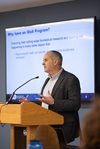Washington Update
FASEB Science Policy Symposium Highlights IDeA and EPSCoR Programs
By: Naomi CharalambakisWednesday, November 15, 2023
 On October 24, FASEB hosted its annual science policy symposium to discuss how the federation can facilitate improved support of federal research capacity programs.
On October 24, FASEB hosted its annual science policy symposium to discuss how the federation can facilitate improved support of federal research capacity programs.The National Institutes of Health (NIH) and National Science Foundation (NSF) administer the Institutional Development Award (IDeA) and the Established Program to Stimulate Competitive Research (EPSCoR), respectively, which seek to broaden the geographic distribution of federal funding for states and territories that historically receive low levels of support. Recognizing the need to create a more inclusive and cross-disciplinary research ecosystem, FASEB’s governance committees examined ways to enhance awareness of IDeA and EPSCoR and catalyze the next generation of research advancements.
Keynote speaker Jon Lorsch, PhD, Director of NIH’s National Institute of General Medical Sciences (NIGMS), described IDeA’s history and purpose, emphasizing its goal to ensure cutting-edge biomedical research and training occur in every state. Among the various components of IDeA is the Centers of Biomedical Research Excellence (COBRE) program, which seeks to establish and develop innovative state-of-the-art biomedical research centers at institutions in IDeA-eligible states through three sequential, five-year awards. To demonstrate the benefit of these awards on the scientific workforce, Lorsch noted that COBRE-supported institutions have experienced a three-fold increased success rate of their junior faculty. Another component of IDeA, the IDeA-Clinical and Translational Research Program, supports clinical and translational research through programs that bolster research infrastructure, workforce development, and collaboration. Such support enables institutions to address region-specific challenges while ensuring states with limited research capacity have access to the people and resources they need.
At NSF, Sandra Richardson, PhD, Section Head of EPSCoR, shared the agency’s goal to address two pressing challenges: the lack of opportunities for all scientific talent and the absence of jobs and innovation in this country. To do so, NSF seeks to ensure that programs target infrastructure improvement, co-funding with NSF directorates and offices, and outreach and engagement. Richardson also highlighted the agency’s targeted efforts to advance workforce development in EPSCoR regions by transforming the career trajectories of investigators and fostering mentorship opportunities for early- and mid-career investigators.
 Symposium participants engaged in interactive, small group discussions to identify policy opportunities that FASEB could leverage to advance IDeA and EPSCoR. Groups discussed ongoing barriers and challenges for states with limited research capacity, strategies for expanding cross-regional partnerships, and metrics of success.
Symposium participants engaged in interactive, small group discussions to identify policy opportunities that FASEB could leverage to advance IDeA and EPSCoR. Groups discussed ongoing barriers and challenges for states with limited research capacity, strategies for expanding cross-regional partnerships, and metrics of success.